28 February 2008
Handy handstrap
A couple of years ago I spotted Kris using a handstrap with his Canon DSLR at Northern Voice 2006. Such a strap can be quite convenient when you don't want to use a full neck strap, and in recent weeks I've thought that getting one would make my grip on my Nikon D50 a little more secure.
Alas, Nikon's own leather strap is stupidly expensive (more than $100 in Canada—you can buy a whole decent point-and-shoot camera for that!). The Canon version was much cheaper, but requires a camera with a bottom strap loop, which few have. Luckily, there was a perfectly acceptable no-name alternative at Amazon. I had to have it shipped to a friend's U.S. post box, since it wasn't available to be shipped to Canada. I received it early this week.
If you look at my camera bottom photo, you can see there's an extra strap hook on the other side of the grip mount, so you can use both the hand and a neck straps at the same time.
What that does mean is, if you use the regular neck strap that way, your camera hangs sideways, but that's fine once you get used to it. Also, the grip mount is well built plastic with key metal bits, but it's fairly large, so if you already have a big SLR, especially with a battery grip, you're heading into the massive Nikon D3/Canon 1D size territory. So check the size of your camera bag before you get one.
Alas, Nikon's own leather strap is stupidly expensive (more than $100 in Canada—you can buy a whole decent point-and-shoot camera for that!). The Canon version was much cheaper, but requires a camera with a bottom strap loop, which few have. Luckily, there was a perfectly acceptable no-name alternative at Amazon. I had to have it shipped to a friend's U.S. post box, since it wasn't available to be shipped to Canada. I received it early this week.
If you look at my camera bottom photo, you can see there's an extra strap hook on the other side of the grip mount, so you can use both the hand and a neck straps at the same time.
What that does mean is, if you use the regular neck strap that way, your camera hangs sideways, but that's fine once you get used to it. Also, the grip mount is well built plastic with key metal bits, but it's fairly large, so if you already have a big SLR, especially with a battery grip, you're heading into the massive Nikon D3/Canon 1D size territory. So check the size of your camera bag before you get one.
26 February 2008
Big-time tech support
I was supposed to have another CT scan today, but the scan machine was broken, and the technicians were on the phone with GE, who make it, to try to find a resolution. My scan will be rescheduled.
Now there's some tech support I wouldn't want to deal with.
More chemotherapy tomorrow. Only two more treatments after that. As far as I know for now, anyway.
Now there's some tech support I wouldn't want to deal with.
More chemotherapy tomorrow. Only two more treatments after that. As far as I know for now, anyway.
25 February 2008
On "The Lab With Leo" again tomorrow
 My podcast co-host Paul and I will once again appearon tech TV show The Lab With Leo tomorrow, as we've done regularly since last spring.
My podcast co-host Paul and I will once again appearon tech TV show The Lab With Leo tomorrow, as we've done regularly since last spring.The show records here in Vancouver, and the episode won't appear for a couple of months on air (on Canada's G4 Tech TV, Australia's How To Channel, and also on City TV weekdays at 11:00 a.m. here in Vancouver). We'll be taping two show segments this time, one on MIDI drums and one on headphones.
I'll let you know when the shows are available online as well.
24 February 2008
Ignorance and bliss
23 February 2008
Northern Voice 2008 main conference day photos
22 February 2008
MooseCamp 2008 photos
Here are my latest photos from MooseCamp, which was the first day of Northern Voice. I've also posted some wacky night pictures from the way home.
At MooseCamp I had a chance to try out a Nikon D3 camera belonging to Matt Mullenweg. It's extremely impressive, probably the most solidly built camera I've ever held. But it is freaking huge—more massive than some medium-format cameras, I think. In contrast, John Biehler's new MacBook Air is shockingly light. Hold one and you'll understand what the fuss is about.
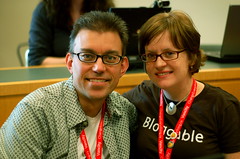






















































At MooseCamp I had a chance to try out a Nikon D3 camera belonging to Matt Mullenweg. It's extremely impressive, probably the most solidly built camera I've ever held. But it is freaking huge—more massive than some medium-format cameras, I think. In contrast, John Biehler's new MacBook Air is shockingly light. Hold one and you'll understand what the fuss is about.























































Labels: blog, conferences, geekery, macbook, meetup, nikon, northernvoice, photography, podcast, web
21 February 2008
Northern Voice TikiCamp photos
It wasn't really called TikiCamp, but the Northern Voice opening tiki dinner at the Waldorf Hotel in Vancouver was a ton of fun. Here are my pictures:















































































More from the main event tomorrow and Saturday.















































































More from the main event tomorrow and Saturday.
20 February 2008
Lunar eclipse photos from Vancouver
In Vancouver, the clouds cleared just long enough for some beautiful views of the lunar eclipse. I got some nice pictures (and so did my dad):














































Mine were taken with a Nikon D50 camera on a tripod, and attached to a Sigma/Quantaray 70-210 mm zoom lens set at f/5.6, ISO 800, exposures generally between a half-second and two seconds. My dad took his with a Canon Digital Rebel XT attached to a Celestron C90 reflector telescope on a tripod, acting as a 1000 mm f/11 lens, with similar exposure times and ISO settings.














































Mine were taken with a Nikon D50 camera on a tripod, and attached to a Sigma/Quantaray 70-210 mm zoom lens set at f/5.6, ISO 800, exposures generally between a half-second and two seconds. My dad took his with a Canon Digital Rebel XT attached to a Celestron C90 reflector telescope on a tripod, acting as a 1000 mm f/11 lens, with similar exposure times and ISO settings.
Tonight's lunar eclipse
 It's already started, and so far the sky only has a few clear patches here in Vancouver, but if you're lucky enough you can head outside in about 45 minutes and see a total lunar eclipse for the last time until late 2010.
It's already started, and so far the sky only has a few clear patches here in Vancouver, but if you're lucky enough you can head outside in about 45 minutes and see a total lunar eclipse for the last time until late 2010.Lunar eclipses are much more common than the famous solar kind, but they are also spectacular in their own way. The moon can turn a deep red colour and appear much more obviously spherical. As the earth's shadow crosses it, you can also see the curve of our planet, showing our own roundness.
So if your skies are clear and it's night where you are, go outside! Check out the moon going into the earth's shadow!
19 February 2008
Easy open packaging? Really?
I've complained before about those infernal ocean-crossing container–resistant sealed blister packs so many products come in. Among the worst are kids' toys like Barbie and Bratz dolls, which have sometimes taken my wife and me as much as 20 minutes to open with the assistance of various sharp implements, and with the consequence of the occasional injury.
So today I was shocked, and very skeptical, about a Bratz doll my older daughter received for her tenth birthday over the weekend. Right there on the package was a big sticker: "NEW EASY OPEN PACKAGE":
Yeah right, I thought.
Then, perhaps three minutes later, the doll and its accessories were free. I had used only my fingers. No scissors, knives, or even teeth. The EASY OPEN PACKAGING really was easy to open. Really!
Is this some sort of sign of the Apocalypse?
So today I was shocked, and very skeptical, about a Bratz doll my older daughter received for her tenth birthday over the weekend. Right there on the package was a big sticker: "NEW EASY OPEN PACKAGE":
Yeah right, I thought.
Then, perhaps three minutes later, the doll and its accessories were free. I had used only my fingers. No scissors, knives, or even teeth. The EASY OPEN PACKAGING really was easy to open. Really!
Is this some sort of sign of the Apocalypse?
18 February 2008
Learning to say no
 Sometimes I forget how sick I am. Not often, but on a day like today when the sun is shining and I have a week off from chemotherapy, when I can take the car in for service, then buy some groceries and take the bus home, make dinner, clean up, help get the kids to bed, and record a podcast, there are times when I forget the cancer.
Sometimes I forget how sick I am. Not often, but on a day like today when the sun is shining and I have a week off from chemotherapy, when I can take the car in for service, then buy some groceries and take the bus home, make dinner, clean up, help get the kids to bed, and record a podcast, there are times when I forget the cancer.At times like this, I have to remember what I've learned in the past year, which is to say no.
When I was healthier, I'd often get roped into (or rope myself into) projects that might be fun, or might benefit me or other people, or might even make me some money—but that turned out to be way more work than I expected. Or I'd end up saying yes to many little things that, individually, wouldn't take much effort, but collectively sucked up way too much of my time.
I can't do that now, and it has been a good lesson. During the rollercoaster of surgeries and radiation and chemo and weight loss and weight regain and wild swings in blood glucose and mood and physical ability since the beginning of 2007, I've simply dropped quite a number of things, sometimes with no warning. The world kept spinning, and the people who had to pick up the pieces did a good job, or made do without my contributions.
Seeing that, I've made myself a rule. When I get offered some freelance work or come across a volunteer project or a hobby activity that I might want to do—the kind of thing I'd have reflexively said yes to previously—I ask myself a question: if I'm well enough to do this kind of work, shouldn't I be ready to go back to my day job? If not (and so far, my answer has always been no, I'm nowhere near healthy enough), then I shouldn't take on anything big and new either. I shouldn't, and can't, juggle what I used to.
It's refreshing. I do smaller things here and there, and have managed to keep doing some activities I really enjoy, such as podcasting, playing with my band on occasion, and writing this blog. I do some chores around the house, hack around with computers, watch a bit of Discovery Channel, hang out with my kids and make sure they get to school in the morning, and spend time with my wife so I can look into her amazing blue eyes.
For now, in between all my medical appointments and such, that's plenty. And that's what I say yes to.
17 February 2008
Blogging about research, and a new way to buy my album
 There's a ton of neat stuff over at ResearchBlogging.org, a site that aggregates blog posts about peer-reviewed research in the social and natural sciences. You can subscribe to an RSS feed for new posts, including citations. The blog from ResearchBlogging is also interesting, especially when it talks about controversies concerning what counts as legitimate research.
There's a ton of neat stuff over at ResearchBlogging.org, a site that aggregates blog posts about peer-reviewed research in the social and natural sciences. You can subscribe to an RSS feed for new posts, including citations. The blog from ResearchBlogging is also interesting, especially when it talks about controversies concerning what counts as legitimate research.Some posts I've really enjoyed based on my biology degree background have been those at Pharyngula about how vertebrate eyes evolved (which, incidentally, firmly debunks the claim creationists frequently make that eyes are too complex to have evolved biologically) and how plant and animal development differ (and why the differences support the indications that our last common ancestor with plants was most likely a single-celled organism living more than 1.6 billion years ago).
And check out this lovely map of the human impact on marine ecosystems, which includes these nasty new marine dead zones off the west coast of North America, not far from where I live.
On a totally unrelated topic, my album Penmachine Sessions, which has been sold out in physical CD form since the middle of last year, is available in a whole bunch of digital forms, with the latest being the Amazon MP3 Store. It might be the best place to buy the album of all, since you get unrestricted, high-quality (256 kbps) MP3 files (that's better than the MP3 files I made for myself!) for only 99 cents each, or $8.99 for the whole album. I think it may only be available to U.S. customers for now, unfortunately.
No, I have no idea at all why Amazon labels my album as "explicit"—particularly because it is almost entirely instrumental music with no words!
16 February 2008
Do not buy Diet Cherry Chocolate Dr. Pepper
I've really liked Dr. Pepper pop since I was a little kid. After I developed Type 1 diabetes in 1991, Diet Dr. Pepper and some of its variants have been favourites of mine too. But the new Diet Cherry Chocolate Dr. Pepper is simply vile.
Chocolate is a good idea most of the time, even with cherries. But combined with Dr. Pepper? Nope. I bought some a couple of weeks ago, and my family has only now managed to drink the last of it. My wife says it tastes like "bad medicine." My kids think it's tolerable only when it's very cold—and normally they'd fall in love with anything even remotely resembling a carbonated beverage. It is even more repulsive than most other sodas when warm.
What I want to know is why plain old and delicious Diet Cherry Coke remains unavailable in Canada. Forget the weird flavour combinations: if I can get that stuff without having to make a run across the U.S. border, I'll be happy.
Chocolate is a good idea most of the time, even with cherries. But combined with Dr. Pepper? Nope. I bought some a couple of weeks ago, and my family has only now managed to drink the last of it. My wife says it tastes like "bad medicine." My kids think it's tolerable only when it's very cold—and normally they'd fall in love with anything even remotely resembling a carbonated beverage. It is even more repulsive than most other sodas when warm.
What I want to know is why plain old and delicious Diet Cherry Coke remains unavailable in Canada. Forget the weird flavour combinations: if I can get that stuff without having to make a run across the U.S. border, I'll be happy.
14 February 2008
Ten and twenty
 The stereotype is that children seem to grow up instantly, but that's not my experience. Our older daughter turned ten today, Valentine's Day. She was born the same day that Catriona Le May Doan won a gold medal at the 1998 Nagano Winter Olympics. Coincidentally, a couple of our good friends had their first child, also a daughter, two days ago. It occurred to me that by the time this new little girl reaches ten, my daughter will be twenty—the age I graduated from university.
The stereotype is that children seem to grow up instantly, but that's not my experience. Our older daughter turned ten today, Valentine's Day. She was born the same day that Catriona Le May Doan won a gold medal at the 1998 Nagano Winter Olympics. Coincidentally, a couple of our good friends had their first child, also a daughter, two days ago. It occurred to me that by the time this new little girl reaches ten, my daughter will be twenty—the age I graduated from university.The past ten years haven't, as the saying usually goes, gone by in a flash. They feel like ten years, really. And that's great. When my wife and I each held our friends' newborn yesterday, in the same hospital where our daughters (and I) were born, the little one's tiny sleeping face and delicious infant smell took us back to those early days when we first dove head-first into the sleep deprivation of early parenthood.
Since then we've had another daughter, now eight, and the kids have grown, learned to walk and talk and read and write and ride bikes and play piano, gone to preschool, made friends, started kindergarten, and now are in the second and fourth grades. They're learning math and spelling and have their own blogs and Gmail accounts. It doesn't surprise me that it took a decade to get here.
This spring also marks the twentieth anniversary of the day my wife and I first met, when we both worked as park naturalists for the Greater Vancouver Regional District parks department (now called Metro Vancouver Regional Parks). We were friends for a few years after that at the University of B.C., then lost touch until spring 1994, when we met again and started dating. By our first Valentine's Day, in 1995, we were already sharing a house and planning our wedding, which took place that August:
She's been my wonderful Valentine ever since, and I've never wanted another. Twenty years doesn't seem an unreasonable time since then either. We've shared and endured a lot together.
Simply being able to say "I met my wife twenty years ago" does make me feel a bit old, but I like that too. Grey hairs might or might not be a sign of wisdom, but they are a sign that I'm still alive. So 2008 is an important anniversary year, especially following the last one. Happy birthday to my daughter. Happy Valentine's Day to my wife. Happy one more day for me.
13 February 2008
Yacht Rock returns from the dead
Yacht Rock may be the greatest web TV miniseries ever created. At least in my opinion. And now, almost two years after the final episode, there is a new one, the official episode 11. (P.S. Language not safe for work.)
Smooth. Really smooth.
Smooth. Really smooth.
11 February 2008
XML turns ten
Tim Bray, who was involved in it all and who lives here in Vancouver, wrote a good story about the beginnings of XML (eXtensible Markup Language), which is the foundation of a lot of how the Web works today. It's a reason that Navarik, the company I work for, has a business, for instance. His story talks about the people who helped make it happen, which is why it's a good story.
At the beginning of his piece, Tim wrote, "XML is ten years old today," because version 1.0 was officially released on February 10, 1998, a few days before my older daughter was born, and during the Nagano Winter Olympics. The specification had been kicking around in draft form for about a year and a half before then.
XML is a powerful way to make information readable and writeable both by computers and by people—and also, most critically, to make it portable between different kinds of devices over different kinds of information networks. In its simplest form, it is merely a well-structured way to format plain-text computer files. And it is an open standard, so no one has to license it or pay for it: you can just use it.
So now you can work with a web browser or a feedreader or another website to grab a web feed from a blog and read or republish it elsewhere. And big companies can wrestle their ancient mainframe computers into sending and accepting data from technologies that hadn't been invented when they were built, like web applications. When you read this website or make an airline reservation or buy a T-shirt online or check your webmail or update your bank balance, XML is involved.
It's one of the key standards that emerged from the dot-com bubble, and has helped the Internet become an essential utility around the world. Not bad for a ten year old.
At the beginning of his piece, Tim wrote, "XML is ten years old today," because version 1.0 was officially released on February 10, 1998, a few days before my older daughter was born, and during the Nagano Winter Olympics. The specification had been kicking around in draft form for about a year and a half before then.
XML is a powerful way to make information readable and writeable both by computers and by people—and also, most critically, to make it portable between different kinds of devices over different kinds of information networks. In its simplest form, it is merely a well-structured way to format plain-text computer files. And it is an open standard, so no one has to license it or pay for it: you can just use it.
So now you can work with a web browser or a feedreader or another website to grab a web feed from a blog and read or republish it elsewhere. And big companies can wrestle their ancient mainframe computers into sending and accepting data from technologies that hadn't been invented when they were built, like web applications. When you read this website or make an airline reservation or buy a T-shirt online or check your webmail or update your bank balance, XML is involved.
It's one of the key standards that emerged from the dot-com bubble, and has helped the Internet become an essential utility around the world. Not bad for a ten year old.
10 February 2008
Relic bass, relic hands

 Last night I played drums in my first gigwith my band since back before my cancer surgery in July. It went quite well, even though this particular lineup (Mark and Adam on guitars, Rick on bass, and Christian and I swapping drum and percussion duties in case I got too tired) had never played together before.
Last night I played drums in my first gigwith my band since back before my cancer surgery in July. It went quite well, even though this particular lineup (Mark and Adam on guitars, Rick on bass, and Christian and I swapping drum and percussion duties in case I got too tired) had never played together before.We set up at 4 p.m., finished that by 6, went out for dinner, returned and started the show by 10, finished at 12:30 a.m., and then packed up and hit the road by 1:30. However, as expected, after getting home at 2 a.m. and then running a bunch of errands after I got up today, I crashed out for a three-hour nap. My wonderful wife took the kids swimming while I was asleep. (Notice how, for two and a half hours of actual playing time, the band actually spent ten hours on call?)
It makes sense that I would be tired only a day after my latest chemo treatment ended. I'm certainly in no position to play as often as I used to, for the same reason I'm still on medical leave from work: my body is taking a lot of punishment from the cancer treatment, and is very slow to recover. I was sore all over today, as if I'd been skiing, and my hands in particular—which seem to be showing the brunt of the chemo side effects right now, with dry skin and strange discolourations—are particularly thrashed. (Part of that is that I've hardly played drums all year, so my usual callouses are gone.) I had to take off my rings today and have been slathering both of my mitts with moisturizing cream.
In fact, my hands somewhat resemble the heavily worn 1966 Fender Jazz Bass guitar that Rick, our bassist for the night, has owned since 1979. It's pretty much stock, with the same body, neck, pickups, and hardware installed at the Fender factory during the Beatles' heyday. Rick is the third owner, and the bass has always been his main instrument since he bought it, seeing thousands of performances. The sunburst finish is almost entirely worn through, front and back. There are actual grooves in the body from where the coin he uses as a pick has made its mark, but even more astonishing, Rick's fingers have very gradually dug channels into the wood over the years too.
Rick's bass is probably the most beat-up playable instrument belonging to any musician I know. It's quite beautiful in its own way, with the history of over 40 years of heavy playing (almost 30 of them Rick's) etched into its surface. It's a player's bass—some collectors would weep at its condition. Other people are happy to have Fender make them a brand new bass and then bang and bash and wear and scrape it up as if it had been played for decades. But as Doug (our other bass player, who has his own beat-up basses, both vintage and artificially "relic" treated) says, it's not the same.
07 February 2008
You might be looking for the other Derek Miller
Just so you know, I am not the Derek Miller who's a nominee for Aboriginal Recording of the Year at the 2008 Juno Awards.
Not that it would be too easy to confuse us. He plays guitar way better than I do, and I have no aboriginal ancestry either.
Not that it would be too easy to confuse us. He plays guitar way better than I do, and I have no aboriginal ancestry either.
Free sort-of open source web designs
UPDATE: Lloyd Budd points out that these are not really open source.
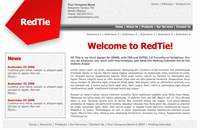 OSWD is a bunch of open-source web designs, most of a bloggy style. There are more than 2000 of them so far, and you can contribute your own—at least if you have better web design skills than I do.
OSWD is a bunch of open-source web designs, most of a bloggy style. There are more than 2000 of them so far, and you can contribute your own—at least if you have better web design skills than I do.Thanks to Bre for the link. Here's a nice example, called RedTie.
(P.S. If you click on the image you'll see what it looks like now that I'm trying out Cabel Sasser's very slick FancyZoom web design JavaScript.)
I think he'll take it
 I'm Canadian, and can't vote in the upcoming U.S. elections. But they affect me, as they affect everyone on the world, so I have opinions.
I'm Canadian, and can't vote in the upcoming U.S. elections. But they affect me, as they affect everyone on the world, so I have opinions.I think—as most seem to—that John McCain or whoever wins the Republican nomination would have to work miracles to win the general election this time around. And I think that's a good thing. His party has damaged his country and its relations with the rest of us in the past seven years, and they do not deserve to keep running it. I hope its citizens agree.
On the Democrat side, there were a number of strong candidates, now down to Hillary Clinton and Barack Obama. As Larry Lessig notes in his video today, their policies do not differ especially radically (although Obama's policy document and website state without equivocation, "I will close Guantanamo," which is enough for me right there). I think either one would make a good president of their nation, and obviously make history doing it.
Where I agree with Lessig, and why I think Obama is a better choice, is that he is inspiring to watch and to listen to in the way no other presidential candidate is, from Clinton to Edwards to McCain and the rest. There is a danger with Obama, as Tom Negrino notes:
What bothers me the most about Obama is his core message, which boils down to "I'm magic, and I'll be able to bring everyone together to move America forward."What I've seen of his policies seems more concrete to me, but it is true that many of his speeches are long on rhetoric and short on details.
Yet rhetoric is not evil if it not empty, if real action follows it. I think Obama can inspire a politics of "hope and common sense," rather than one of "fear and ideology," as he says. To lead the United States, he need not know the answer to every question—that's why presidents hire smart staffs—but he does need to listen, and to prompt action.
I think one reason he inspires so many already is that while he does give speeches crafted by a team of top-notch writers, he doesn't sound like a machine while he does it. He comes across as a human being. Clinton may be smarter, more knowledgeable, and more experienced, and I hope if Obama wins she can find a place to execute her ideas in his administration. (And if she wins, I certainly hope he can find one in hers.)
But she is not more inspiring. America and the rest of us need inspiration now. America's citizens need to say to us, and to themselves, "We have been on the wrong path, and we will choose a different and better way." To see and to listen to Barack Obama as president will demonstrate the beginning of that choice. If I'm right, I think he will win.
06 February 2008
Fun fun fun
 Once again, it is snowing crazily here in Burnaby. It seems like we've had many more days of snow this year than usual. I like it, it feels very Canadian here, but I can't go out and enjoy it.
Once again, it is snowing crazily here in Burnaby. It seems like we've had many more days of snow this year than usual. I like it, it feels very Canadian here, but I can't go out and enjoy it.That's because today I started my ninth chemo treatment(out of twelve total) in this cycle, which began in October and will finish at the end of March. I'll spend most of tonight in bed watching Iron Chef America and MythBusters. I'll probably also be lying down most of tomorrow.
If things go as they usually do, I'll be a bit better by Friday, and pretty much back to normal by Saturday, when I hope to play drums with my band for the first time since July.
But right now I feel just gross. Bleah.
04 February 2008
Can you make money from blogging and podcasting?
 As someone who's been a Vancouver blogger for more than seven years, and podcasting here for almost three, I often hear the question in the title of this post. But that's not what the questioners usually mean. What they want to ask is: Can you make a living from blogging and podcasting?
As someone who's been a Vancouver blogger for more than seven years, and podcasting here for almost three, I often hear the question in the title of this post. But that's not what the questioners usually mean. What they want to ask is: Can you make a living from blogging and podcasting?The short answer is yes, but don't go and quit your day job just yet. I didn't say that just anyone should try to pay for your food, lodging, and transportation needs (plus those for your spouse and kids) from blogs and podcasts, or that you could make a huge living from them. It's possible, but I don't do it, and haven't even tried. You should be aware that, just like anything else, making a living online would be a job, not some sort of free-money fantasy life.
My wife, who's also a blogger and podcaster, and I were talking about it this morning before she went to work (she's had the same stable, rewarding, good-paying professional day job for more than 15 years, and isn't planning on quitting that anytime soon). For us, our online activities are hobbies. They bring in a little money from ads and sponsorships, usually enough to cover their costs and maybe buy the occasional dinner.
Blogging for money
 The people I know who work as bloggers, like Arieanna, work hard. She writes at least five different work blogs (plus others) all day, every day, sometimes until late at night. (If I had to scour the news for links about Mischa Barton all day, I'd probably go batty. And that's just one blog.)
The people I know who work as bloggers, like Arieanna, work hard. She writes at least five different work blogs (plus others) all day, every day, sometimes until late at night. (If I had to scour the news for links about Mischa Barton all day, I'd probably go batty. And that's just one blog.)If you look at blogs that are popular enough to pay people's salaries—like Arieanna's and the others at b5media, or the Weblogs Inc. network that includes Engadget and its siblings, or successful independent blogs like Daring Fireball—they tend to be very focused and updated many times a day.
They often attract lots of comments, which require moderation and feedback, and their posts tend to be well sourced or individually researched, and also well written and concise. In many cases, the words are carefully crafted to attract search engine traffic, and the blogger may spend quite a bit of time writing about things he or she isn't all that interested in, or at least (as in any job) may have days where the job is just a slog, rather than a joy. Money-generating blogs take a lot of effort, skill, and time to maintain. They're work.
In other words, don't expect to dash off a paragraph every couple of days about what your kids ate for breakfast and have the ad revenue pour in.
Now, if you can find a day job where you spend a significant part of your time blogging, that's another matter. If I weren't on medical leave right now, I'd be doing that over here (notice that the "Daily Blog" isn't very daily while I'm absent). But that blog—and private internal blogs and wikis the company runs behind a firewall—is just a slice of my day job, not the whole thing, so I don't think it counts either.
Podcasting for money
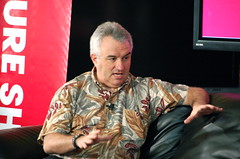 Podcasting, as an even newer medium than blogging, has an even less-established income stream. Search engine optimization and contextual advertising don't work as well for podcasts, audio or video. Like most bloggers (and like me), the vast majority of podcasters do what they do as a hobby. They (like me) might bring in a bit of cash from sponsors and podcast network advertising and so on. But podcast production is even more labour-intensive than blogging, and unless you put out shows quite frequently and build a significant audience on an appropriate topic (or topics, if you can manage several shows), it will be pretty hard to pay a mortgage.
Podcasting, as an even newer medium than blogging, has an even less-established income stream. Search engine optimization and contextual advertising don't work as well for podcasts, audio or video. Like most bloggers (and like me), the vast majority of podcasters do what they do as a hobby. They (like me) might bring in a bit of cash from sponsors and podcast network advertising and so on. But podcast production is even more labour-intensive than blogging, and unless you put out shows quite frequently and build a significant audience on an appropriate topic (or topics, if you can manage several shows), it will be pretty hard to pay a mortgage.Even Leo Laporte, whose This Week in Tech (TWiT) network attracts some of the biggest audiences in podcasting (numbering the hundreds of thousands each week), and who runs an extremely efficient podcasting operation largely by himself, still has a day job. Several, in fact. He remains a widely syndicated radio host, as he has been for decades, and also helms a cable TV show on which I've appeared (as a guest paid only in exposure and with a free take-out lunch) a few times.
Leo probably could make his podcasts a full-time gig, but presumably chooses instead to funnel what money he gets back into the network and to honoraria for his guest hosts. Others, like podcast pioneer Adam Curry, have used venture funding to create a buffer while they try to build businesses like PodShow into something large and viable.
Individual podcasters who work hard can also make a job of it. No one I know well does that, but among the tens of thousands of podcasts out there, a small number can keep their hosts fed, clothed, and housed. Again, those tend to be focused, well produced, frequent—and lucky. If you got into the game early, or happened to hit a certain niche at just the right time, or worked hard on a concept that struck a chord with the (still relatively small) podcasting audience, and then hustle like hell, you might be able to quit that day job, if that's what you want.
It used to be about the music, man...
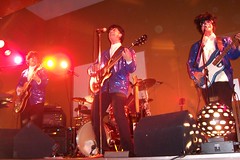 In many ways, being a podcaster or blogger is like being a musician. Far more people play music, or blog, or podcast, for fun than make a living at it. I was a full-time musician for awhile in the early '90s, and it was tough work, with long hours, lots of low-budget travel (not a requirement online, fortunately), and crappy pay. I quit after I got married, because that life wasn't what I wanted long term.
In many ways, being a podcaster or blogger is like being a musician. Far more people play music, or blog, or podcast, for fun than make a living at it. I was a full-time musician for awhile in the early '90s, and it was tough work, with long hours, lots of low-budget travel (not a requirement online, fortunately), and crappy pay. I quit after I got married, because that life wasn't what I wanted long term.The people I know who have made a career of music—and several of the guys in my band do just that, even though I haven't—aren't Rock Stars. They're working professionals. They do a lot of different things: they teach music, work as studio sidemen, tour with established acts, make instructional videos, play at casinos, entertain at weddings and corporate meetings, compose soundtracks, produce and engineer other acts, give seminars, and record jingles. They keep accounts, pay taxes, save money for retirement, buy health insurance, and run their careers as businesses.
I think anyone looking to work in blogging in podcasting is going to have to do something similar. Be professional, work hard. Use your online activities as leverage to do other things. Even in my blog's early days, it didn't make me any direct money at all, but it brought in plenty of work when I was a freelance technical writer and editor. Similarly, being an expert blogger or podcaster (or even better, both) can help you make money in other ways—such as helping other people and organizations make blogging and podcasting part of what they do.
It's not magic, it's work
 If you're going to make money online, you'll need an entrepreneurial impulse, or you'll need to work with others who do. You need to know how these new media work, and how to promote and take advantage of them in all sorts of ways.
If you're going to make money online, you'll need an entrepreneurial impulse, or you'll need to work with others who do. You need to know how these new media work, and how to promote and take advantage of them in all sorts of ways.The Web and its technologies are still a frontier, and you'll probably have to bust your butt to succeed. You need to flexible and see opportunities you might not expect—selling cool T-shirtsand mugs and stuff might make you more dough than any kind of sponsorship or advertising, for instance.
Or, if you're like me, you might prefer to let your blogs and podcasts be fun things that you do on the side, not something that you have to do every day, and which might burn you out after awhile.
The Internet is pretty damn cool, but it's not magic. Those who succeed on it are the same ones who succeed anywhere: they're smart, skilled, and have good ideas. They make realistic plans and knuckle down to put them in action. They hustle. And sometimes they fail and have to try again with a wiser view.
02 February 2008
Subprime mortgages were always insane
I've never run a business any larger than my own solo writer-editor endeavour, and didn't enjoy the paperwork of that very much. I don't like reading business magazines, I don't play the stock market at all, and most financial analysts on TV, radio, the Web, and newspapers give me the heebie-jeebies. So I'm no financial expert.
Still, in the past few years, I couldn't understand why anyone in the U.S. could think a subprime mortgage (better called a "high-risk mortgage" or a "poorly qualified mortgage") would be a good idea for anybody. I heard some stories about them, but it wasn't really an issue in Canada, so I thought these mortgages were a silly, fringe thing and pretty much forgot about them.
People borrowing from banks and mortgage brokers and other finance companies who offered these mortgages were betting that house prices would keep going up indefinitely and interest rates would stay low, no matter what. The firms and financial analysts were, insanely, betting the same. Sometimes the companies loaned people more money than their houses were worth at the time on that assumption—and didn't check on their customers' ability to pay either!
I'm only 38 years old, but I've seen several economic booms, busts, and recessions in my lifetime. I remember when interest rates were 17% and higher in the early '80s, and my junior high school classmates and I—barely comprehending teenagers at the time—laughed out loud when our teachers said loan interest used to be 4% and lower. We never thought that would happen again. And if it did, we knew that could change. The dot-com boom and bust are less than a decade old too.
So I agree completely with Daniel Gross when he writes at Slate that bankers and financiers, now getting pounded in the markets because the subprime mortgage situation (which is vaster than I could have imagined anyone letting it get) is now shooting holes in the U.S. economy, are acting like a bunch of spoiled toddlers:
And why do investors continue believe them when they're wrong more often than weather forecasters used to be before we had satellites?
Still, in the past few years, I couldn't understand why anyone in the U.S. could think a subprime mortgage (better called a "high-risk mortgage" or a "poorly qualified mortgage") would be a good idea for anybody. I heard some stories about them, but it wasn't really an issue in Canada, so I thought these mortgages were a silly, fringe thing and pretty much forgot about them.
People borrowing from banks and mortgage brokers and other finance companies who offered these mortgages were betting that house prices would keep going up indefinitely and interest rates would stay low, no matter what. The firms and financial analysts were, insanely, betting the same. Sometimes the companies loaned people more money than their houses were worth at the time on that assumption—and didn't check on their customers' ability to pay either!
I'm only 38 years old, but I've seen several economic booms, busts, and recessions in my lifetime. I remember when interest rates were 17% and higher in the early '80s, and my junior high school classmates and I—barely comprehending teenagers at the time—laughed out loud when our teachers said loan interest used to be 4% and lower. We never thought that would happen again. And if it did, we knew that could change. The dot-com boom and bust are less than a decade old too.
So I agree completely with Daniel Gross when he writes at Slate that bankers and financiers, now getting pounded in the markets because the subprime mortgage situation (which is vaster than I could have imagined anyone letting it get) is now shooting holes in the U.S. economy, are acting like a bunch of spoiled toddlers:
Children typically display an unwillingness to reckon with the consequences of their own actions. They look to parents to pick them up when they fall, and spare them from responsibility for their misbehavior. And parents will go to great lengths to insulate their offspring from the jolts the world can deliver.As we face another recessionary slump (maybe insulated a bit here in Canada), we're all going to pay for that childishness, because governments don't have enough money to do anything but cushion the blow a little. Steven Pearlstein put it even more simply in the Wall Street Journal almost a year ago:
The same might be said about Washington's current economic ministrations. The nation is now nursing a seriously skinned knee because of reckless housing and credit practices. But rather than force consumers, borrowers, and bankers to face the consequences of their own actions, Washington is functioning as a helicopter parent.
Bankers shouldn't make—or be allowed to make—mortgage loans that require no money down and no documentation of income to people who won't be able to afford the monthly payments if interest rates rise, house prices fall or the roof springs a leak. It's not a whole lot more complicated than that.What I do wonder is, when people are losing or walking away from homes they shouldn't have been able to buy in the first place, and also losing jobs as the economy weakens, why do the well-paid supposed mavens of Wall Street, and other finance types around the world who bought into this scheme, still have jobs?
And why do investors continue believe them when they're wrong more often than weather forecasters used to be before we had satellites?
01 February 2008
Microsoft + Yahoo! = Um, Well...
I summarized my opinion of the proposed $45 billion takeover of Yahoo! by Microsoft in my comment on Robert Scoble's post:
I think if the merger happens, it will take ages to bring the two companies together, Yahoo!’s best people will bail out, and by the time the smoke clears, Google will have lapped Yahoosoft/Microhoo several times. Bad for both sides, and in the end for users, in my opinion.Here's what some other people had to say:
Then again, I know nothing about running a business. These are just my instincts.
- Scott Rosenberg
- Andrew Leonard
- Kara Swisher
- Jeff Jarvis
- Dave Winer
- Angela Gunn
- John Gruber
- Marshall Kirkpatrick
- Kevin Kellher at GigaOM
- Erick Schonfeld at TechCrunch
- Merlin Mann
- Tim Bray
- Adam Engst at TidBITS
- Farhad Manjoo
- Time Weber at the BBC
- Dave Pell
- Scott Schnaars
- John Siracusa
- Fake Steve Jobs
- David Drummond, Senior VP at Google
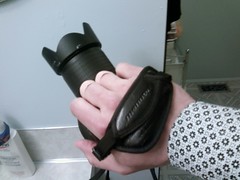
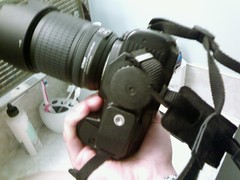
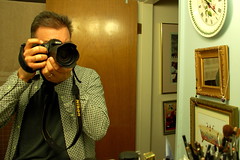
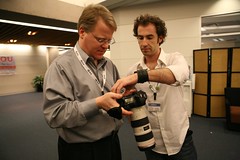




















































































No comments:
Post a Comment